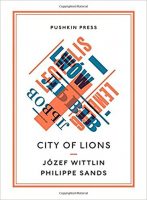
 Today, two perspectives on loss and memory.
Today, two perspectives on loss and memory.
“I close my eyes and I can hear the bells…ringing; each one rings differently. I can hear the splash of the fountains on the Marketplace, and the soughing of the fragrant trees, which the spring rain has washed clean of dust. It is coming up to ten o’clock and the place is so quiet that I can recognize the people going past by their footsteps as they hurry home for dinner. I recognize the footsteps of people who ceased to walk this earth long ago. There’s no one but shades clacking their heels on the well-worn pavement slabs.”
So writes the Polish author Jozef Wittlin, conjuring up his native city of Lviv in his essay My Lwow, which he wrote in exile in New York in 1946.
The essay has been recently translated into a whimsically lyrical English by Antonia Lloyd-Jones and published in a haunting new book entitled City of Lions.
Wittlin was fortunate to escape. He was in Paris at the outbreak of World War II. After the collapse of France he managed to escape via Portugal to the United States and continued writing. He passed away in 1976.
Wittlin was baptized and considered a Christian writer. But he always spoke openly of his connection to the Jewish world. Before the Second World War, he published reviews of Polish Jewish poetry and foreign literature on Jewish subjects. Critics consider that the Holocaust inspired some of his best poems.
Wittlin’s wry and often joyful reminiscences of his city were those of an early twentieth century Lviv still glittering with an imperial Austrian splendor. It was a city he called “Diversified, variegated, as dazzling as an oriental carpet.” And it was a city that ceased to exist by 1945.
City of Lions includes the matching essay My Lviv by Philippe Sands, an international legal expert and professor of law at University College London. Sands’s essay echoes the Wittlin text by providing a parallel meditation on a very different Lviv as it is today.
What brought Sands to Lviv? He writes, “I returned because of the darkness, not in spite of it… it felt like home, a place of origin, where family began.” Sands’s grandfather Leon was born in the city in 1904 but never spoke of it to his family. Sands came to see the wounds behind the silence.
Sands observes “Lviv is an assault on the senses and the imagination. Much has been hidden, but nothing is lost, not completely, especially if you are willing to do your homework and search carefully.”
And search he did, discovering also that two giants in international law, both considered creators of the modern human rights movement, studied law at Lviv University. Rafael Lemkin is famous as the man who invented the word “genocide.” Hersch Lauterpacht created the concept of “crimes against humanity.”
The writer Eva Hoffman, in her preface to City of Lions, notes that both essays “are pervaded by a sense of the city’s almost magnetic fascination—and of great loss.”
Wittlin concludes his elegiac paean to Lviv with a phantasmagorical scene. Historic characters from the city’s colorful past join forces in a surreally celebratory huge crowd that streams endlessly around the city center.
Sands, in his ending, mirrors Wittlin’s procession through the ghosts of Lviv. Sands however is more measured and skeptical, calling out the failure of those in today’s Lviv to fully acknowledge all its history. Nonetheless Sands admits the ineffable spirit of the city ultimately seduces him.
Wittlin makes the rueful observation: “Yes, gradually our entire memory becomes a cemetery. Wherever it takes you, there are graves.”
Sands, in his twenty-first century update, reminds us that for entire populations there were no graves. On one of his many trips to Lviv, he takes a stroll in the countryside outside of the town of Zhovkva to ponder the fate of the local Jews on a fateful spring day in 1943.
“There were ponds, two great sandpits filled with an expanse of dark water and mud and reeds that bent in the wind,” he writes. “We sat on the grass, watched the remains of the sun fall onto the dark, still water that stretched tight across the openings of the earth. Deep down, untouched for half a century or more, lay the remains of the 3,500 people. Amongst them were members of Lauterpacht’s family, and of mine. The sun warmed the water, the trees pointed upward and away from the reeds, towards an indigo sky.”
City of Lions, with these two remarkable essays by Jozef Wittlin and Philippe Sands, is published by the Pushkin Press in London and available in bookstores and from on-line booksellers.
This has been Ukrainian Jewish Heritage on Nash Holos Ukrainian Roots Radio. From San Francisco, I’m Peter Bejger. Until next time, shalom!

